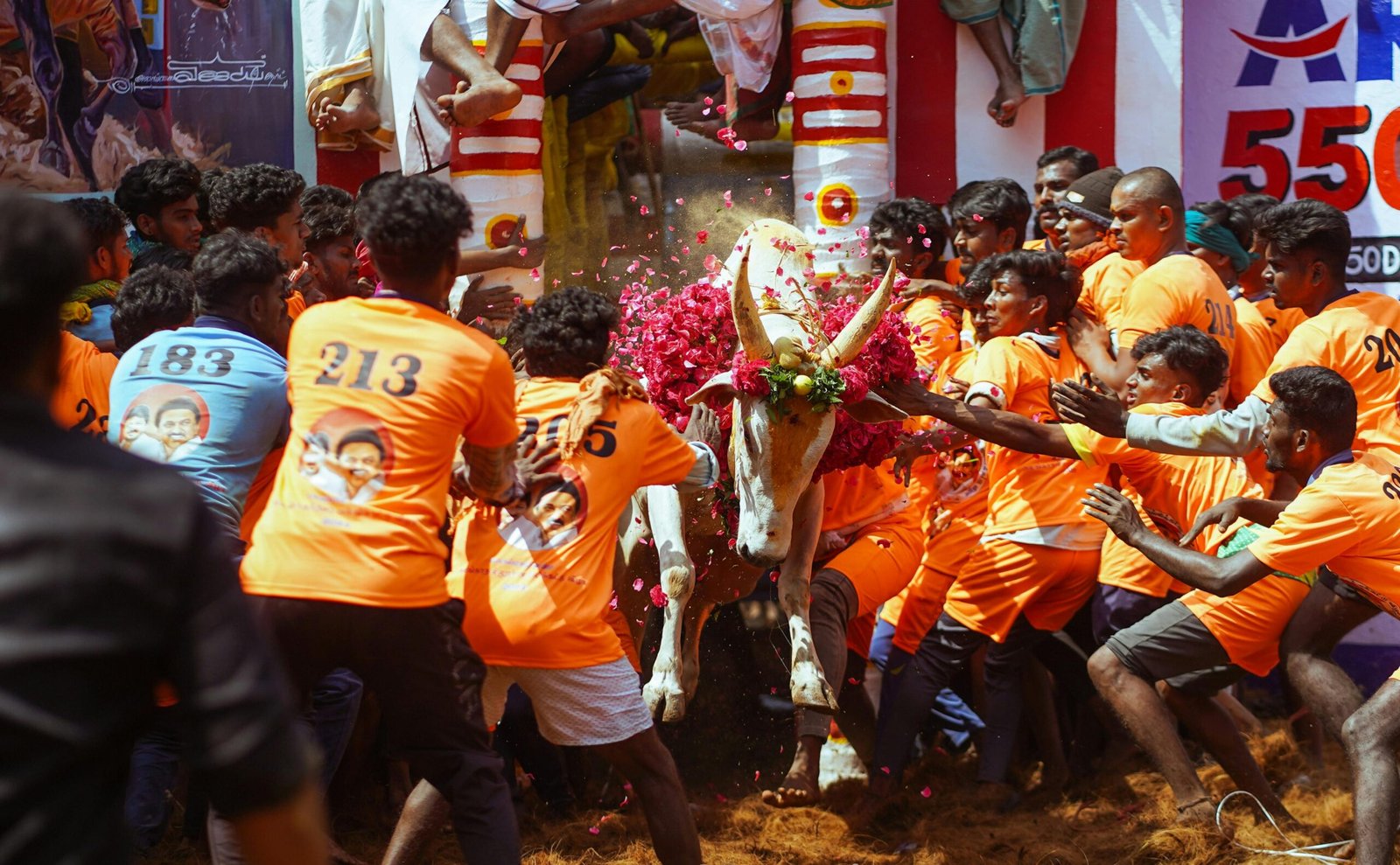Jallikattu, a traditional event deeply rooted in the culture of Tamil Nadu, particularly in Madurai, represents not only a thrilling display of skill and bravery but also the rich agricultural heritage of the region. This bull-taming sport is typically held during the Pongal festival, which celebrates the harvest and is an integral part of Tamil festivities. The event sees a group of participants, known as ‘vaadivasal’, face off against bulls that have been specially trained for the occasion.
The practice of Jallikattu has its origins in ancient Tamil literature and has been celebrated for thousands of years. The bulls used in this event are usually native breeds that possess strength and agility. Each bull is adorned with decorative ornaments, symbolizing its significance in the local culture. The event consists of seasoned tamers attempting to grab the folded nose strip or hold onto the hump of the bull as it charges through the arena. The primary aim is to tame the bull without being thrown off, showcasing both courage and mastery over a formidable animal.
Historical Background of Jallikattu
Jallikattu, a traditional bull-taming event, has deep roots in the ancient history of Tamil Nadu, tracing back over 2,000 years. Its origins can be found in the cultural practices outlined in ancient Tamil literature, specifically in classical works such as the Sangam poetry. Tamil warriors who participated in various bull-related contests, illustrating the event’s significance in society as a test of bravery and skill.
The depiction of Jallikattu can be seen in the form of sculptures in Madurai Meenakshi Temple, inscriptions, and cave paintings, highlighting its prominence in Tamil culture through the ages. Significant archaeological findings, including those from the ancient city of Madurai, have revealed engravings and murals that showcase scenes of these events, suggesting that Jallikattu was not merely a sport but a social and cultural ritual. These artistic expressions emphasize the integral role that bulls played in agricultural life, symbolizing prosperity and strength, which is reflected in the reverence for them in various festivals.
Cultural Significance of Jallikattu
Jallikattu is not merely a traditional bull-taming event it serves as a vibrant cultural emblem for the Tamil Nadu region, showcasing the rich heritage and communal ethos of its people. This event typically takes place during the Tamil harvest festival, Pongal, and it reflects the integration of community, agriculture, and tradition. At its core, Jallikattu represents the agricultural lifestyle that is deeply rooted in the Tamil identity, symbolizing the bond between man and nature, as well as the mutual respect for livestock.
The significance of Jallikattu extends beyond the thrill of the event itself. It acts as a catalyst for community bonding as local villages come together to celebrate their customs, share stories, and participate in this age-old tradition. Families and friends gather to encourage participants, creating a sense of unity and shared purpose. Such gatherings reinforce social ties and foster an environment where cultural values are passed down through generations, ensuring that the essence of the Tamil identity remains intact.
Moreover, the preservation of traditional practices is a vital aspect of Jallikattu. Participants don traditional clothing, and the event often includes local songs and dances, enriching the cultural tapestry of the community. The event is not only significant in a material sense but also in a spiritual one, as it reflects the reverence for the bulls that are integral to agrarian life. The relationships built during these festivities highlight the importance of maintaining cultural practices that honor history while promoting community participation.
Ultimately, Jallikattu embodies the spirit of Tamil Nadu, serving both as a testament to agricultural heritage and a key contributor to social cohesion. Its cultural significance is indisputable, urging a deeper exploration into the traditions that shape regional identities.
History Of Madurai Meenakshi Amman Temple

The Event: How Jallikattu is Conducted
Jallikattu, a traditional bull-taming event celebrated in Tamil Nadu, embodies the rich cultural heritage of the region. The event typically occurs during the Pongal festival, taking place in January, where villagers gather to participate in this age-old celebration. Preparations commence well in advance, with farmers selecting and training their best bulls for competition, ensuring they are physically fit for checking the fertile quality of the Bulls.
On the day of the event, the atmosphere is charged with excitement and celebrations. Spectators, adorned in traditional attire, gather in large numbers to cheer for their favorite participants. The venue is often enclosed, and bamboo barricades are set up to delineate the play area, ensuring the safety of both participants and the audience. Each bull is decorated with colorful garlands and bells, further enhancing the festive spirit.
“Tamers,” must exhibit courage and skill as they attempt to grasp the hump of the bull and maintain their hold for as long as possible. The duration of this hold is crucial, as it determines the success of the tamer. Various styles of taming are employed, showcasing not only strength but also agility and technique. Some tamers opt for a direct approach, while others use distraction or agility to outsmart the bull, reflective of the diverse methods passed down through generations.
Symbolism of the Bull in Jallikattu
The bull serves as a potent symbol in Tamil culture, particularly within the context of Jallikattu, which is a traditional bull-taming event celebrated in the Indian state of Tamil Nadu. This event transcends mere sport; it is deeply intertwined with the cultural fabric and societal values of the region. In Tamil Nadu, bulls are revered for their strength, endurance, and masculinity, traits that resonate profoundly with the local populace. The bull epitomizes qualities such as bravery and tenacity, making it an emblem of honor and valor in rural Tamil society.
In the agrarian landscape of Tamil Nadu, bulls have historically been integral to farming practices, assisting in plowing fields and transporting goods. This functional relationship enhances the symbolic importance of bulls in the lives of the people, reinforcing the notion of the bull as a cornerstone of rural identity and agricultural heritage. The reverence for bulls is also evident in various art forms, traditional folklore, and festivals, all of which celebrate the animal’s strength and significance in daily life.
The act of taming the bull during Jallikattu symbolizes the struggle between man and nature, embodying themes of courage and respect. Participants, known as ‘jallikattu players,’ aim to assert their dominance over the bull, yet it is crucial to note that this event is framed within a context of mutual respect and understanding. The interaction showcases how participants honor the animal’s spirit and strength, even as they engage in a competitive display. Ultimately, the symbolism of the bull in Jallikattu is a vivid reflection of the societal values of resilience, honor, and respect for the natural world that are deeply embedded in Tamil culture. In conclusion, the bull’s representation transcends its physical presence, embodying a rich tapestry of cultural meaning that resonates with generations.
Controversies and Criticisms Surrounding Jallikattu
Jallikattu, a traditional bull-taming event celebrated in Tamil Nadu, has been at the center of significant controversy in recent years. The clash between cultural heritage and the protection of animal rights has sparked widespread debate, drawing attention from various stakeholders, including animal rights activists, government authorities, and local communities. Critics of the event argue that Jallikattu promotes cruelty towards bulls, as participants often use aggressive methods to subdue the animals. Reports of injuries to bulls and instances of death have fueled claims that the traditional practice is inherently dangerous and inhumane. This perspective has led to calls for stricter regulations or outright bans on the event, driven by the desire to uphold animal welfare standards.
Proponents of Jallikattu, on the other hand, passionately defend the event as an integral part of Tamil Nadu’s cultural identity. They emphasize the historical significance of Jallikattu and its role in local customs, asserting that it fosters community spirit and engagement. Supporters point out that when conducted responsibly, the event can be safe for both participants and animals. Many argue that banning Jallikattu would result in the loss of a cultural heritage that has been preserved for centuries. Additionally, they highlight that the event plays a vital role in the conservation of native cattle breeds, promoting their importance in agriculture and rural livelihoods.
Global Influence and Recognition
Jallikattu, a traditional bull-taming event from Tamil Nadu, has transcended its regional origins to garner global attention and recognition. The event, which showcases not only the bravery of participants but also their deep-rooted connection to local culture, has become a focal point for tourists seeking immersive cultural experiences. As global tourism has evolved, many travelers are now interested in witnessing this unique spectacle firsthand, leading to an influx of visitors during the festival season. This surge in interest has prompted local authorities and organizations to enhance their outreach strategies to promote Jallikattu as a key cultural attraction.
Furthermore, the role of social media has been instrumental in elevating Jallikattu’s profile on a global scale. Platforms such as Instagram, Facebook, and X.com Formerly [Twitter] have allowed enthusiasts and participants to share their experiences and emotions connected to the event. By documenting their experiences and posting images and videos online, they create a visual narrative that captivates a worldwide audience.
As international dialogues about biodiversity, animal rights, and cultural preservation continue to evolve, Jallikattu stands at a unique intersection. Human interest stories surrounding the event encourage global communities to engage with discussions about tradition, conservation, and the essence of cultural heritage. The growing recognition of Jallikattu highlights its significance beyond mere entertainment, making it a subject worthy of both admiration and critical reflection.
Conclusion:
The future of Jallikattu encompasses a complex interplay between the rich cultural heritage it represents and the contemporary challenges it faces. As one of Tamil Nadu’s most cherished traditional events, Jallikattu not only embodies the valor and resilience of the Tamil people but also serves as a symbol of their deep-rooted connection to agriculture and livestock. However, with increasing concerns about animal rights, legal constraints, and public safety, the event is at a pivotal crossroads that calls for reflection and adaptive measures.
To navigate these challenges, it is essential for stakeholders to engage in constructive dialogue that respects both tradition and modern ethical considerations. Creating awareness about the significance of Jallikattu in Tamil society can play a crucial role in garnering support. Educational initiatives that highlight Jallikattu’s cultural aspects, historical origins, and its importance in promoting local identity could help bridge gaps between differing viewpoints. Engaging local communities, schools, and organizations in discussions and events that celebrate this tradition may foster a deeper understanding and appreciation


![Shopping Streets In Madurai [Buy Gift For Her/Him]](https://maduraimirror.com/wp-content/uploads/2025/01/An-Young-And-Beautiful-France-Girl-Travel-And-Shopping-Freak-Shopping-In-the-Streets-Of-Madurai-19-01-2025-at-19-41-03-768x768.webp)
![Madurai Famous Foods Non Veg And Veg [Taste Now]](https://maduraimirror.com/wp-content/uploads/2025/01/Give-Me-Image-Of-Eye-catchy-Images-For-Authetic-Mutton-Briyani-Which-Is-Served-In-Long-Greeny-banan-17-01-2025-at-14-36-40-1-768x768.webp)
![Top 7 Best Gyms in Madurai [With Personal Trainers]](https://maduraimirror.com/wp-content/uploads/2025/01/Best-Gym-In-madurai-768x768.webp)

